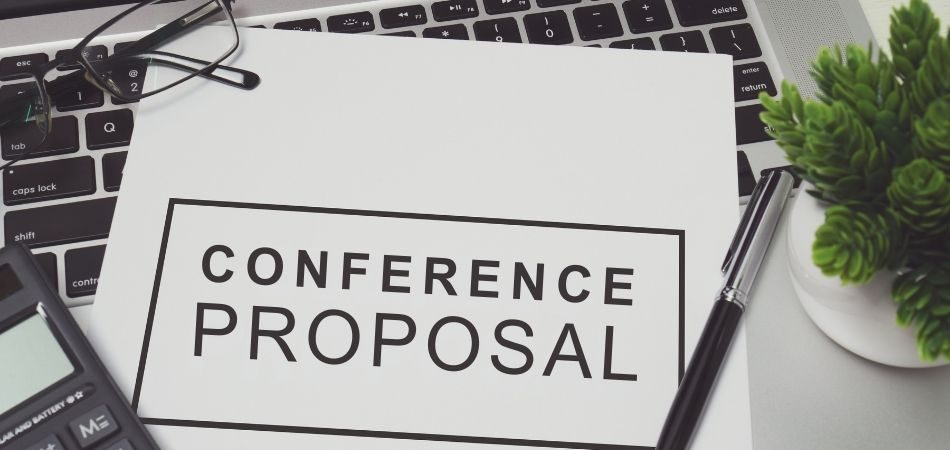Securing approval to attend a conference abroad often comes down to how well you present your request. It’s not enough to simply say you want to go. Decision-makers look for a clear, thoughtful explanation of why the event matters and what value it will bring.
That’s where a strong proposal comes in. Learning how to write a proposal to attend a international conference gives you the tools to outline your goals, justify the costs, and show the benefits for both you and your organization. A well-structured document proves that you’ve done your research and that the investment is worth making.
Think of your proposal as both a plan and a promise. It shows your intent to grow professionally while also giving something back through knowledge sharing, improved projects, and stronger connections. With the right approach, you can turn your request into an opportunity that is hard to deny.
How to Write a Proposal to Attend a International Conference?
Securing approval to attend an international conference often depends on the strength of your proposal. Decision-makers rarely say yes without a clear plan, and that’s why your document needs to go beyond enthusiasm. A strong proposal shows why the event matters, how it connects to your work, and what tangible benefits your organization will gain from your participation.
Think of it as your case for investment because attending a global event involves time, money, and trust. The better you explain your goals, outline the benefits, and present a realistic budget, the more likely you’ll get the green light.
In the next steps, you’ll learn exactly how to structure a winning proposal and use ready-made templates that save time and impress reviewers.
Step-1: Research the Conference
Start by thoroughly researching the conference theme, agenda, speakers, and key sessions. Reviewing an upcoming international conference list can help you compare different events and select the one most relevant to your goals. Once you’ve chosen, explain clearly why this event matters to your field and demonstrate how attending will support your professional growth.
Step-2: Review Submission Requirements
Carefully review the specific proposal guidelines set by your organization or funding body. Understanding the expected length, format, and key elements avoids rejection and ensures compliance with approval requirements.
Step-3: Define Your Objectives
Clearly state what you aim to achieve, such as gaining knowledge, networking with experts, or presenting your work. Well-defined objectives prove your purpose and show measurable value for attending the event.
Step-4: Highlight Organizational Benefits
Explain how attending will benefit your team or institution. Discuss knowledge transfer, collaboration opportunities, and practical insights you will bring back to strengthen ongoing projects or future initiatives.
Step-5: Provide a Budget
Prepare a detailed budget including registration, travel, accommodation, and meals. Justify every expense to show financial responsibility, while also mentioning potential cost-saving strategies like early registration discounts.
Step-6: Plan for Coverage
Reassure decision-makers by outlining how your tasks will be managed during your absence. Identify colleagues covering responsibilities or automation tools that will minimize any disruptions in workflow.
Step-7: Outline ROI and Deliverables
Demonstrate how you will ensure a return on investment. Commit to sharing notes, preparing a report, or conducting a presentation that transfers valuable insights to your organization after the conference.
Step-8: Proofread and Submit
Before submitting, carefully check for grammatical errors, clarity, and formatting. A polished proposal reflects professionalism and increases credibility with the decision-makers reviewing your request.
Proposal Template You Can Use
Below is a ready-to-fill conference proposal template you can copy, adjust, and submit to your manager or funding committee.
[Your Name]
[Your Position / Department]
[Date]
To: [Approver’s Name]
Subject: Request for Approval to Attend [Conference Name]
I am writing to request approval to attend [Conference Name] taking place in [City/Country] on [Dates]. The conference aligns with my responsibilities in [area of expertise] and will provide valuable insights into [specific topics].
Key benefits for our organization include:
– Access to the latest research and trends in [field]
– Building international connections with experts and potential partners
– Sharing knowledge with our team through a report and follow-up session
Estimated total cost: [insert budget]. A detailed breakdown is attached.
I appreciate your consideration and look forward to your approval.
Sincerely,
[Your Name]
How to Format and Submit Your Proposal?
Even the best-written proposal can lose impact if it looks messy or arrives late. Decision-makers often skim through multiple requests, so a clean format and proper submission can make your document stand out. Paying attention to the best practices for proposal writing ensures your work looks professional and is taken seriously. Let’s break down the key points you shouldn’t miss.
Keep the Layout Professional
Start with a simple title page that includes your name, department, the conference title, and the dates. Use a consistent font like Arial or Times New Roman, size 12, with clear headings and subheadings. White space and bullet points make the document easy to read.
Stay Consistent from Start to Finish
Check that margins, line spacing, and text alignment are the same across the document. Avoid mixing fonts or using too many styles. A neat, consistent look signals attention to detail and helps your proposal feel more polished.
Save in the Right Format
Always export your final draft as a PDF. This keeps the formatting intact no matter who opens it. Keep a digital copy for quick sharing and print one if your organization requires physical submission.
Follow Submission Guidelines
Double-check deadlines and instructions provided by your organization or funding body. If they require email submission, include a clear subject line. If they want a printed copy, bind or staple it neatly. Meeting these small details can make a big difference.
Extra Tip: Keep a Backup
Always save a copy for yourself. Store it on your computer, cloud drive, or even as a printed version. If there’s ever a delay or a lost email, you’ll have a version ready to resend.
Formatting and timely submission might seem like small details, but they can make or break your proposal. A clean, professional, and well-delivered document shows respect for the approval process and makes reviewers more likely to take your request seriously.
What Approvers Really Look For?
When someone reviews your proposal, they’re not just glancing at the title. They want to see if the request is practical, necessary, and worthwhile. Knowing their priorities will help you craft a stronger, more convincing document. Think of the following points as essential proposal writing tips that will guide you in forming a request that decision-makers can’t ignore.
Relevance
Approvers need to understand why this specific conference matters to you and your role. Show a direct link between your current projects and the event’s theme, so it’s obvious your attendance connects with organizational goals and professional development.
Clear Objectives
Vague intentions won’t convince anyone. You must state measurable goals such as attending workshops, learning industry updates, or networking with experts. This proves you’re attending with a clear plan that delivers benefits beyond simply being present at the event.
Budget Justification
Budgets are often the biggest concern. Instead of throwing numbers together, break down costs with details like registration, travel, and accommodation. This shows you’ve thought it through carefully and makes it easier for approvers to trust your financial responsibility.
ROI (Return on Investment)
Approvers expect something valuable in return. Commit to sharing takeaways through reports, presentations, or training sessions. Highlight how new insights or connections can help your team save time, improve processes, or generate fresh opportunities after the conference ends.
Coverage Plan
No manager wants unfinished tasks piling up during your absence. Reassure them by explaining how your workload will be handled. Mention specific colleagues or systems in place, so they know responsibilities won’t suffer while you’re away attending the event.
By keeping these factors at the heart of your proposal, you’ll match the exact concerns of decision-makers and increase your approval chances. Next, let’s dive into the step-by-step guide to building your proposal.
What to Include in the Budget Section of Your Proposal?
The budget section is one of the most important parts of your proposal because it shows decision-makers exactly how much support you’re asking for. A clear and transparent budget proves that you’ve thought carefully about all expenses and that your request is realistic. Before drafting, you can also search for international conferences to attend and compare fees or travel costs, which helps you prepare a more accurate estimate. Here’s what you should include:
Registration Fees
List the registration costs for the main event. Fees often differ for early-bird, student, or professional rates. Also include extra charges for workshops or add-on events. Showing this detail demonstrates you’ve researched all options.
Travel Expenses
Break down your transportation costs, such as flights, trains, or buses. Don’t forget local transport like taxis or shuttles to the venue. Mentioning economical options, like booking early or taking shared rides, reflects responsible financial planning.
Accommodation Costs
Provide estimated hotel or lodging costs near the conference venue. If discounted partner hotels are available, note them. You can also suggest room-sharing or alternative stays to reduce expenses, which shows flexibility and cost-awareness.
Meal Expenses
Include daily meal costs during your stay, covering breakfast, lunch, and dinner. If the conference provides meals, subtract those from your estimate. Accounting for every meal avoids surprises and makes your budget look realistic and thoughtful.
Visa and Documentation Costs
Don’t forget essentials like visa fees, travel insurance, or other required paperwork. These are easy to overlook but can be significant. Adding them strengthens your proposal and proves you’re accounting for all necessary requirements.
Miscellaneous Costs and Contingency
Consider extra expenses such as printing, networking events, or internet access. Always add a small contingency (5–10% of the total budget) for unexpected costs. This reassures reviewers that you’re prepared for surprises without asking for more later.
Sample Budget Table
| Category | Item | Estimated Cost | Notes |
| Registration | Main Conference Pass | $450 | Early-bird rate applied |
| Travel | Round-trip Flight | $750 | Economy class, booked early |
| Travel | Local Transport | $80 | Airport transfer + venue shuttles |
| Accommodation | 4 Nights Hotel Stay | $600 | Partner hotel with conference rate |
| Meals | Daily Meals (4 days) | $160 | $40 per day |
| Documentation | Visa Application | $120 | Based on embassy fees |
| Miscellaneous | Contingency (5%) | $115 | Covers unforeseen costs |
| Total | $2,465 |
Including a clear and detailed budget not only proves you’ve considered every expense but also builds confidence with those reviewing your proposal. The more transparent and organized your budget looks, the easier it becomes for approvers to say yes.
Coverage Plan and Risk Management
When you’re away at a conference, managers need reassurance that things at work won’t grind to a halt. They want to see that tasks are covered, deadlines will still be met, and no important responsibility will fall through the cracks.
A strong coverage plan shows you’re thinking ahead, while risk management proves you’ve considered possible issues and prepared solutions. Together, these make your proposal more reliable and convincing. Let’s look at a few ways you can document this effectively.
Example 1: Assigning Responsibilities
Create a short handover note that lists who will take over your key tasks while you’re gone. For instance, “Project A updates will be handled by Sarah, and client calls will be covered by John.” This shows clear delegation.
Example 2: Preparing Task Guides
Write quick instructions for ongoing duties that others may need to pick up. It could be as simple as a step-by-step checklist for handling customer emails or a guide for running weekly reports. Easy-to-follow notes minimize confusion.
Example 3: Setting up Contingency Steps
Not everything can be predicted, but you can outline what to do if something urgent comes up. For example, “If any system error occurs, contact IT directly at [contact info]” or “If client X calls, escalate to [manager’s name].”
By showing exactly how work will continue smoothly and how unexpected problems will be managed, you remove a big concern for decision-makers. A clear coverage plan backed with simple risk strategies builds trust and makes approval much more likely.
Why is a Proposal Letter Important?
Before you think about budgets and schedules, it’s worth asking why a proposal letter is needed at all. Managers and funding committees rarely approve requests without a clear explanation, and that’s where a letter makes all the difference. It acts as your official request, but more importantly, it builds trust and shows that you’re serious about the opportunity. In many cases, you may also need to get an invitation letter for global conferences to support your proposal, especially when travel or visa approval is involved. Now, let’s get to know why this proposal letter is important.
Shows Purpose and Professionalism
A proposal letter proves that you’ve thought things through. Instead of just asking for permission, you’re presenting a structured request that outlines your goals, the event’s relevance, and how you plan to apply what you learn afterward. A simple letter to request to attend a conference can serve this purpose effectively.
Justifies the Investment
Conferences involve costs like travel, lodging, and fees. The letter explains why those expenses are worth covering. When you connect the investment to clear outcomes, such as new skills or stronger connections, it makes approval easier.
Clarifies Benefits for the Organization
Decision-makers want to see how your attendance helps more than just you. A strong letter highlights how you’ll share insights, improve ongoing projects, or open doors to new collaborations that benefit the entire team or department.
Creates a Record of Your Request
Having a written proposal ensures everything is documented. This avoids confusion later and provides a reference for both you and your manager about what was agreed upon, including costs, benefits, and responsibilities.
A proposal letter is more than a formality. It sets the tone for your request, shows respect for the approval process, and increases the chances of getting a positive response. With a clear letter, your case becomes far more convincing.
Common Mistakes to Avoid
Even a solid proposal can get overlooked if small but important mistakes creep in. The good news is that most of these errors are easy to fix once you know what to watch for. Think of this section as a quick checklist to make your proposal stronger and more convincing. Looking at strong conference proposal examples can also give you ideas on how to avoid these mistakes. Let’s walk through the most common mistakes with weak vs. strong approaches.
Unclear Objectives
- Weak: “I want to attend to learn new things.”
- Strong: “I aim to attend three workshops on digital strategy, connect with five industry experts, and present my current project findings.”
Ignoring Guidelines
- Weak: Submitting a two-page note when the organization asked for a structured proposal with budget and benefits.
- Strong: Following the exact format requested, including title page, budget table, and organizational benefits section.
Overlooking the Audience
- Weak: Using jargon like “leveraging omnichannel attribution frameworks” that reviewers outside your field won’t understand.
- Strong: Explaining in simple terms: “I will learn new tools for tracking marketing campaigns that can directly improve how we measure results.”
Weak Budget Justification
- Weak: “Conference cost: $2,000.”
- Strong: “Registration: $500, Flights: $750, Accommodation: $600, Meals: $120, Miscellaneous: $30. Total: $2,000.”
Skipping Proofreading
- Weak: Sending a proposal with typos, grammar mistakes, and inconsistent formatting.
- Strong: Reviewing carefully, using a spell-check tool, and asking a colleague to read it before submission.
Avoiding these mistakes can make your proposal look professional and persuasive instead of rushed or careless. Always aim for clear objectives, a detailed budget, and simple, polished writing that makes it easy for decision-makers to say yes.
Post-Conference Deliverables (Knowledge Transfer Plan)
When you attend a conference, decision-makers don’t just want to know what you’ll learn there. They want to be sure the knowledge you gain will make its way back to the team. That’s why it’s important to outline how you’ll share outcomes after the event. Showing this plan in your proposal builds confidence that the investment won’t stop with you but will benefit everyone. Let’s look at a few simple and effective ways to do this.
Internal Presentation or Debrief
Offer to run a short session for your colleagues after you return. A 20–30 minute presentation with slides can highlight the most useful sessions, new trends, and practical ideas worth applying to current projects.
Written Summary or Report
Provide a clear written document that captures your main takeaways. This doesn’t need to be long, two to three pages with bullet points and recommendations are often enough to give others quick access to what you learned.
Actionable Recommendations for Projects
Take what you’ve gathered and link it directly to ongoing work. Suggest how a new method, tool, or strategy can improve efficiency, save costs, or open opportunities. Decision-makers appreciate proposals that turn learning into action.
Outlining post-conference deliverables shows that your attendance will create value for the whole organization. By committing to presentations, reports, and actionable ideas, you prove the event is more than a trip, it’s an investment with clear returns.
Frequently Asked Questions
People often have small but important doubts after learning how to write a proposal. To clear those up, here are some straightforward answers to common questions that don’t always get explained in detail. These should make your next step a lot easier.
How Early Should I Start Preparing My Proposal?
It’s best to start at least a month before the conference deadline. This gives you time to research, draft, and gather all documents. Rushing at the last moment often leads to missed details.
Can I Request Partial Funding Instead Of Full Coverage?
Yes, many organizations allow partial requests. For example, they might cover registration while you manage travel or meals. Offering this flexibility shows goodwill and can increase your chances of getting approved.
Should I Attach Supporting Documents With My Proposal?
Adding supporting documents can make your case stronger. Examples include a conference agenda, speaker list, or even a letter of invitation. These extras help reviewers see the real value of your request.
What If My Proposal Gets Rejected?
If your proposal isn’t approved, ask for feedback right away. Knowing what was missing will help you improve the next version. Sometimes, revising and resubmitting is all it takes to succeed.
Do I Need My Manager’s Approval Before Submitting?
Yes, in most organizations, your manager’s sign-off is required before sending it to higher authorities. This step avoids confusion later and ensures your team is aware of your absence. Always double-check the internal process.
How Detailed Should My Budget Be?
Keep it specific but not overwhelming. Break down the main categories like registration, travel, and meals, and provide estimates for each. Showing you’ve calculated properly makes your request easier to trust.
Can I Use The Same Proposal Template For Future Events?
You can reuse the basic structure, but always customize it for each conference. Highlighting the unique benefits of that event makes it more convincing. A generic proposal often feels careless to decision-makers.
Concluding Lines
Getting approval to attend a conference abroad often depends on how well you prepare your request. Simply saying you want to go is rarely enough. Managers or funding bodies want to see why the event matters and how it will add value.
That’s why learning how to write a proposal to attend a international conference is so important. A strong proposal for conference approval outlines your goals, explains the benefits, and shows exactly how the costs are justified. It helps decision-makers feel confident that supporting your request is a smart choice.
Think of your proposal as a plan that highlights growth for you and your organization. By making it clear, organized, and practical, you increase your chances of turning a simple request into an approved opportunity.












